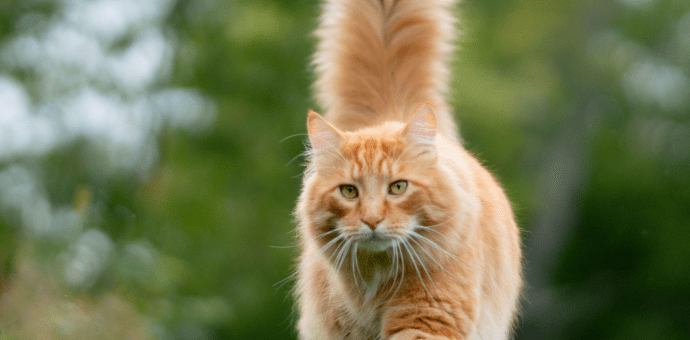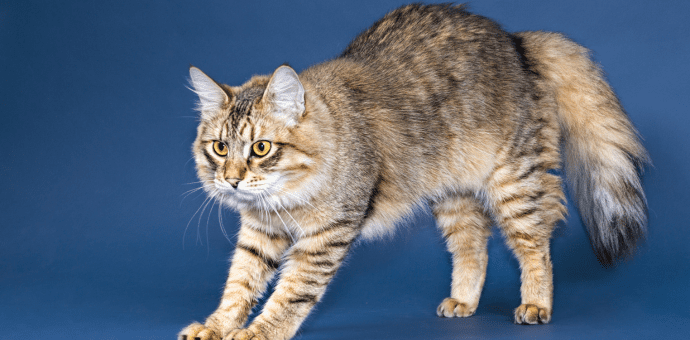Unneutered male cats, also known as intact male cats or unneutered toms, or unfixed male cats, it’s crucial to understand their behaviors, risks, and proper care. Unneutered male cats have unique behaviors driven by their hormonal makeup, and addressing their needs is vital for their well-being. These behaviors include spraying, aggression towards other cats or humans, roaming tendencies, and increased sexual behaviors.
As Team PetsPaa, we know that rearing and managing an unneutered male cat is a challenging task but after this article, we will understand the distinctive behaviors of unneutered male cats, the possible risks of keeping them intact, and the best care, including alternatives to neutering.
Table of Contents

Introduction
Unneutered male cats are also known as intact male cats or unfixed male cats. In other words, male cats not neutered have not undergone a surgical procedure to remove their testicles. This implies that they can still reproduce and may display behaviors specific to unneutered cats.
Understanding Unneutered Male Cat Behavior
According to studies by the American Veterinary Medical Association (AVMA), unneutered male cats are more prone to display unique behaviors related to their hormonal and reproductive state. Understanding their behavior can help cat owners manage and care for their cats more effectively.
Sexual Behavior
Unneutered male cats are strongly urged to mate and breed, which can result in a variety of sexual behaviors:
- Spraying: Intact males often mark their territory by spraying strong-smelling urine on vertical surfaces, such as walls or furniture, to communicate their presence and reproductive availability to other cats.
- Roaming: Unneutered males greatly desire to find mates, driving them to move and wander in pursuit of female cats, often far from their home territory.
- Aggression: Competition for mating opportunities can cause violent behaviors in intact males, including fights with other male cats. This leads to injuries and an increased risk of contracting disorders such as feline leukemia or feline immunodeficiency virus (FIV).
Territorial Behavior
Unneutered male cats also exhibit territorial behaviors aimed at establishing and defending their territory:
- Marking: Apart from spraying, intact males may use other forms of marking, such as scratching furniture or objects with their claws, rubbing their bodies against surfaces, or leaving scent cues through facial rubbing to claim and defend their territory.
- Dominance: Unneutered males may display dominant behaviors towards other cats, both male, and female, to establish their hierarchical status and protect their territory.
Roaming Behavior
Unneutered males may wander beyond their familiar territories in order to find possible mates and establish territory:
- Increased roaming: Male cat not neutered may go far from home to pursue females, increasing their chances of getting lost, harmed, or getting into accidents.
- Disorientation: Unneutered males who roam may get disoriented and confused as they diversify unfamiliar with their surroundings, making them more vulnerable to harm.

Health Risks and Concerns Associated with Unneutered Male Cats
Apart from behavioral issues, keeping unneutered male cats intact carries health risks. Because of their hormonal and reproductive condition, unneutered male cats are more vulnerable to reproductive-related and other health hazards. Understanding these are essential for cat owners to keep their pets healthy and happy.
Injuries from Territorial Fights
- Increased Risk of Injuries: Unneutered male cat are more prone to fight territorially with other male cats, resulting in wounds, scratches, and bites. These injuries can cause discomfort, infection, and other consequences that need veterinarian care.
- Abscesses: Fights with other cats can also result in abscesses and painful localized infections that can form under the skin. Abscesses may require draining, antibiotics, and wound care to heal properly.
Exposure to Diseases
- Feline Leukemia (FeLV): Unneutered male cats who wander and fight are at a higher risk of developing FeLV. This viral infection targets the immune system and can result in a variety of health problems such as anemia, organ damage, and cancer.
- Feline Immunodeficiency Virus (FIV): male cat not neutered and participating in aggressive behavior and fights are also at risk of developing FIV. This viral infection affects the immune system, which can lead to chronic infections and other health problems.
- Other Contagious Diseases: Unneutered males wandering can expose them to infectious illnesses like feline respiratory infections and parasites, which can severely influence their general health and well-being.
Reproductive Health Concerns
- Testicular Tumors: Males who are not neutered are in danger of developing testicular tumors, which can be malignant and require removal by surgery. The possibility of testicular tumors and other reproductive health disorders is eliminated by neutering.
- Prostate Problems: An intact male may be prone to some prostate diseases such as benign prostatic hyperplasia (BPH) or prostatitis. These prostate concerns can cause discomfort, pain, and other urinary system problems.
- Hernias: Unneutered males may also be at risk of developing hernias, which are abnormal protrusions of organs or tissues through the abdominal wall muscles. Hernias can cause pain, discomfort, and potentially severe complications if left untreated.

Prevention of Health Risks and Concerns Associated with Unneutered Male Cats
Neutering
Neutering or castration, is a surgical procedure that involves removing the testicles of male cats to prevent them from reproducing. Neutering unneutered male cats can effectively prevent various health risks and concerns associated with their reproductive status.
Spraying, aggressiveness, roaming, and sexual behavior can all be considerably reduced by neutering. According to scientific studies, neutered male cats are less likely to exhibit these behaviors than unneutered males. Neutering also provides several health advantages, including a lower incidence of testicular cancer, prostatic illness, and behavioral disorders.
Other Preventive Measures (Alternatives to Neutering)
Some pet owners may be hesitant or unable to opt for neutering for various reasons. Here are some alternatives to neutering for male cats:
Minor Surgical and Non Surgical Procedures
- Vasectomy Procedure: Vasectomy is a minor surgical operation by which the vas deferens cuts or obstructs. Vas deferens are the tubes that deliver sperm from the testicles to the urethra without removing the testicles. This method prevents sperm from mixing with seminal fluid during ejaculation, thus sterilizing the male cat.
- Advantages of Vasectomy: Unlike neutering, vasectomy allows male cats to retain their normal testosterone levels, which can assist them in maintaining muscular strength, coat quality, and behavior. It also retains the average hormonal balance while avoiding the risks and problems of testicular removal.
- Suprelorin Implant: This is a hormonal implant that temporarily suppresses the production of reproductive hormones in male cats. It provides temporary contraception for several months to a year, but it is not a permanent solution and needs to be replaced periodically.
Contraceptive Injections
- Contraceptive Injections: Contraceptive injections, also known as chemical castration, involve medications that inhibit the production or function of hormones responsible for sperm production in male cats. A veterinarian typically administers these injections, which must be repeated regularly.
- Considerations for Contraceptive Injections: Contraceptive injections are effective for temporary contraception in male cats but are not long-term options. They must be monitored regularly and may have adverse effects. Before choosing this option, it is critical to consult with a veterinarian about the dangers and advantages of contraceptive injections.

Behavioral Modifications
- Behavior Modification Techniques: Some undesirable behaviors in male cats, such as roaming, marking, and aggression, are often associated with the presence of intact testicles. Behavior modification techniques, such as environmental enrichment, training, and pheromone therapy, may help address these behaviors without neutering.
- Consultation with a Veterinarian or Animal Behaviorist: Pet owners should work with veterinarians or animal behaviorists to create a personalized behavior modification plan that meets their male cat’s unique requirements and behaviors.
Responsible Pet Ownership
- Responsible Management Practices: Responsible management of male cats, such as keeping them indoors, offering mental and physical activity, and minimizing exposure to unspayed females, can help prevent undesired breeding and lower the hazards associated with intact males.
- Keeping Cats Indoors or Indoor Living: Keeping unneutered male cats indoors can significantly reduce their risk of injuries from fights with other cats, as well as exposure to contagious diseases like FeLV and FIV. Indoor cats are also less likely to contribute to overpopulation by mating with unspayed females.
- Providing Environmental Enrichment: Indoor cats should have ample opportunities for play, exercise, mental stimulation, and social interaction to ensure their physical and mental well-being.
- Regular Veterinary Care & Check-ups: Unneutered male cats should have regular veterinarian check-ups, vaccines, and parasite prevention treatments to preserve their general health and reduce the risk of illness.
- Responsible Pet Ownership: Providing a secure and caring environment for unneutered male cats, including sufficient feeding, shelter, and mental stimulation, can improve their general health and well-being.
- Education and Awareness: Pet owners should educate themselves about the health risks and concerns associated with unneutered male cats and spread awareness among others to encourage responsible pet ownership and neutering.
Proper Care for Unneutered Male Cats
Unneutered male cats require proper care to ensure their health and well-being. While neutering is the recommended and reliable option for most pet owners, providing appropriate care to address their unique needs is essential if you choose to keep your male cat unneutered. Here are some headings and subheadings to guide you in providing proper care for unneutered male cats:
Diet and Nutrition
- Balanced Diet: Providing a balanced and nutritionally complete diet is essential for the overall health of your unneutered male cat. Feed them high-quality commercial cat food that meets their age, size, and activity requirements. Avoid feeding them table scraps, as human food may not provide the proper nutrients for cats.
- Portion Control: Monitoring the portion sizes and avoiding overfeeding is crucial to prevent obesity, which can be more common in unneutered male cats. Follow feeding guidelines and consult with your veterinarian for recommendations on the appropriate amount of food to feed your male cat.

Exercise and Enrichment
- Regular Exercise: Unneutered male cats may have a higher energy level and increased territorial instincts. Regular exercise through playtime, interactive toys, and climbing opportunities can help them burn off excess energy, reduce stress, and prevent behavioral issues.
- Environmental Enrichment: Creating an enriched environment for your unneutered male cat can help prevent boredom and reduce the risk of destructive behaviors. Provide scratching posts, hiding spots, perches, and toys to stimulate them mentally and physically.
Environmental Management
- Indoor Living: Keeping your unneutered male cat indoors can assist to minimize mating behavior, battles with other male cats, and disease transfer. Create a secure and entertaining indoor habitat with litter boxes, scratching posts, hiding places, and perches.
- Secure Outdoor Access: If you allow your unneutered male cat to go outdoors, providing secure and supervised access is essential. Use a harness and leash or an enclosed outdoor space to prevent roaming, mating behavior, and potential conflicts with other cats.
Health Care
- Vaccinations: Unneutered male cats should receive regular vaccinations to protect them against common feline diseases. Follow your veterinarian’s recommendations for vaccinations, including rabies, feline herpesvirus, calicivirus, and feline leukemia.
- Parasite Prevention: Regularly deworming your unneutered male cat and providing flea and tick prevention measures are essential to prevent infestations and protect their overall health. Consult with your veterinarian for appropriate parasite prevention products and dosages.
- Regular Veterinary Check-ups: Schedule regular check-ups with your veterinarian to monitor the health of your unneutered male cat. Your veterinarian can advise on proper care, detect potential health issues early, and provide appropriate treatment if needed.
Behavioral Management
- Redirecting Mating Behavior: Male cats who have not been neutered might exhibit mating behaviors such as spraying and aggression toward other cats. Positive reinforcement training, environmental enrichment, and play can assist in preventing undesirable behaviors.
- Managing Territorial Instincts: Unneutered male cats may have stronger territorial instincts and mark their territory with urine. Providing multiple litter boxes, keeping the litter boxes clean, and using pheromone diffusers can help manage territorial instincts and prevent inappropriate marking behaviors.

Legal Requirements and Regulations
It’s important to be informed of any potential legal requirements and restrictions pertaining to neutering or maintaining unneutered male cats, depending on your locality. Some areas may have restrictions or ordinances requiring neutering or particular instructions for caring for unneutered male cats. It is critical to follow these rules in order to ensure the legal and ethical treatment of unneutered male cats.
Conclusion
Unneutered male cats exhibit instinct-driven behaviors with health risks. Neutering is effective, but alternatives like behavioral modifications may be considered. Consulting a vet, adhering to legal requirements, and providing a safe environment are vital for responsible ownership.
In conclusion, while neutering is the most effective way to manage behaviors and reduce risks in unneutered male cats, alternative options like behavioral modifications may exist. Consulting a vet, following legal requirements, and providing a safe environment are essential for responsible ownership. Proactive care ensures a healthy and happy life for unneutered male cats.






